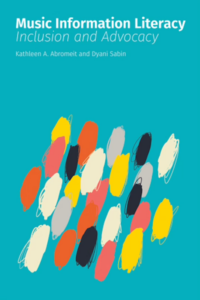Music Information Literacy
Inclusion and Advocacy
Editor: Kathleen A. Abromeit and Dyani Sabin
Price: $60
November 2024
ISBN: 978-1-63400-146-5
242 pages
Book Launch Events:
Becoming a more equitable librarian is an ongoing process. In the face of the last decade’s events and increased public awareness of issues of diversity, equity, inclusion, and accessibility (DEIA), we in music libraries can do things to create the space in our teaching for optimal creativity and connection by and with our library users. Music Information Literacy: Inclusion and Advocacy imagines what it would be like to expand our inclusion structures so that we increasingly recognize and accommodate differences in our music libraries.
The ways librarians teach and assist students must change to amplify the voices of those who have been traditionally marginalized and create effective and equitable libraries and classrooms. Doing so is a multi-part process, where critical information literacy overlaps with self-reflection as a librarian and a deep understanding that our students have identities and experiences that influence how they navigate their world.
Many of our students have experienced trauma from the generational oppression of systemic racism, gender fluidity, invisible disabilities, discrimination, or poverty. Ongoing trauma triggers toxic stress that can rewire parts of the brain and impact one’s ability to process information, formulate questions, and feel safe enough to be creative and in the zone of ideas. The chapters in the volume are authored by librarians who have actively been learning and self-reflecting on what is needed to invite users into their libraries and teaching spaces fully. The book is divided into Critical Theories, Concepts, & Reflections, Bringing Underrepresentation to the Forefront, and Supporting Activism. Each chapter includes case studies and discussion questions supporting ideas and concepts. A sample reading guide for each chapter is included as well.
Kathleen A. Abromeit is the Head of the Conservatory Library, she oversees all aspects of the library’s programs and services. She works to create positive, engaging, and user-centered experiences for students. She enjoys collaborating with faculty to develop meaningful library experiences for students. Her areas of scholarly interest include music information literacy, faculty/librarian collaboration, African American spirituals, library inclusion and advocacy, and outreach. Her publications include the monographs An Index to African-American Spirituals for the Solo Voice (Greenwood Press, 1999), Spirituals: A Multidisciplinary Bibliography for Research and Performance (Music Library Association and A-R Editions, Inc., 2015), Ideas, Strategies, and Scenarios in Music Information Literacy (Music Library Association and A-R Editions, Inc., 2018), and An Index to Negro Spirituals (SUNY Press, forthcoming). She is active in the Music Library Association. She oversees the Music Received column in Notes: The Quarterly Journal of the Music Library Association and is MLA’s Publication Committee chair.
Dyani Sabin is a freelance science journalist who has covered artificial intelligence, technology, and women’s health issues for National Geographic, The Washington Post, Popular Science, Inverse, and The Daily Beast. She has a master’s in science journalism from New York University and an MFA in Popular Fiction from the University of Southern Maine’s Stonecoast Program. Her areas of scholarly interest include Romani literature and Romani depiction in opera. She worked as a reference and circulation assistant in the Oberlin College library system. She believes libraries are one of our most important public services to create community and social change.
Table of Contents
Kathleen A. Abromeit and Dyani Sabin
I. Critical Theories, Concepts, & Reflections
Trauma-Informed Information Literacy
Lynn Gullickson Spencer and Leanne M. VandeCreek
Engaging Students in Anti-Racist Information Literacy Through Critical Assessment
Elizabeth Sullivan, Liz Lang, Annie Dempsey, Shannon Simpson, Alonso Avila, Brandi Hart, and Lisa Morrison
Education Equity: Music Theory Information Literacy at a Hispanic-Serving Institution (HSI)
Charles Roush, Katrina Roush, and Norma Denae Dibrell
Music Information Literacy Advocacy at Historically Black Colleges and Universities (HBCUs)
Nurhak Tuncer Bayramli and Juliet M. Boykins
Using Stephen Foster’s Statue to Teach Critical Information Literacy
Karen J. Olson
II. Bringing Underrepresentation to the Forefront
Show Them Who You Are: Code-switching and Code-meshing in the Academy
Eboni A. Johnson
Information Literacy Beyond the Binary
Holling Smith-Borne and Sara J. Beutter Manus
Music Library Instruction for ESOL Students
Marci Cohen and Patrick Quinn
Stop Being a Fatphobe: Bringing a Larger Conversation to Critical Information Literacy
Kathleen A. Abromeit and Grace Elliott
III. Supporting Activism
Digital Accessibility in Music Libraries: Designing Your Way to User Success
Kristi Bergland
Identifying and Overcoming Bias in Library Discovery Systems
Leslie J. Collie and Joel Roberts
Ben Daigle, Timothy Keller, and Sarah Schaff
Fostering Inclusion and Belonging in the Applied Clarinet Studio
Lenora Schneller
Decolonizing Orchestral Repertoire: A Special Collection Vision
Gary Galván
